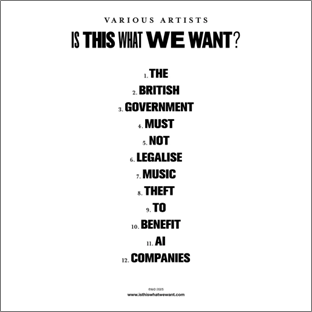A Silent Protest: UK creators show silence can be more eloquent!

In a bold move to defend their creative rights, more than 1,000 musicians, including renowned artists like Kate Bush, Damon Albarn, and Annie Lennox, have released a silent album titled Is This What We Want? The artists involved include not only musicians but also notable figures from various creative fields, such as actor Julianne Moore and writers Val McDermid and Richard Osman. This unprecedented project aims to protest the UK government’s proposed changes to copyright law, which artists argue would facilitate the unauthorised use of their work by artificial intelligence (AI) companies.
The Sound of Silence
The album, released on 25February 2025, coincides with the closing of a public consultation regarding the copyright changes. It features twelve tracks, each absolutely devoid of sound. Yet collectively, they convey a powerful message through their titles listed in sombre black over a pristine white back cover. Read in sequence, the track-list forms one complete sentence that says: “The British government must not legalise music theft to benefit AI companies.”

Image:The track-list on the back cover of the album“Is This What We Want?”; Source: BBC
Ed Newton-Rex, a British composer and one of the driving forces behind the album, explained that the government’s proposals would essentially hand over the hard-earned work of musicians to AI companies for free, allowing these firms to undercut and outcompete original creators. He emphasised that the UK could lead in AI technology without sacrificing its vibrant creative industries.
In the closing lines of a letter signed by various artists and addressed to the editor of The Times, the creative fraternity elucidated their stand on the apparent conflict between art and technology:
“…Britain’s creative industries want to play their part in the AI revolution, as they have with new technologies in the past. But if this is to succeed, they need to do so from a firm intellectual-property base. If not, Britain will lose out on its best growth opportunity. There is no moral or economic argument for stealing our copyright. Taking it away will devastate the industry and steal the future of the next generation.”
The Context
The UK government’s plans would permit AI developers to utilise content available online for training their models without securing permission from the creators. This includes a provision that allows rights holders to “opt out.” However, many artists believe this approach is not only impractical but also detrimental to their livelihoods. They fear that such legislation could lead to a significant loss of income and creative control, effectively allowing AI companies to exploit their work without compensation.
In a statement, Kate Bush raised a poignant question: “In the music of the future, will our voices go unheard?” This sentiment resonates deeply among artists who see their life’s work at risk. The silent album features recordings of empty studios and performance spaces, symbolising the silence that may ensue if their rights are not protected.
While the government proposal allows creators to opt out, critics argue that this system is impractical, as it would be nearly impossible for individual artists to monitor or notify countless AI providers about their content. Tom Kiehl, head of UK Music, echoed these concerns, stating that the changes could jeopardise an industry already contributing over £120 billion to the economy. The government insists it aims to protect artists while consulting with the music sector on these changes.
The Reaction
The backlash against the proposed copyright changes has been widespread, with numerous prominent figures voicing their concerns. The likes of Sir Paul McCartney and Elton John have joined the chorus, warning that these changes could pave the way for “rip-off” technologies that threaten artists’ ability to earn a living. In a letter published in The Times, a coalition of 34 leading creatives, including Andrew Lloyd Webber and Ed Sheeran, criticised the government’s stance, describing it as a “wholesale giveaway of rights and income” from the UK’s creative sectors to big tech companies.
The silent album is not just an artistic statement; it is part of a larger campaign called Make It Fair. This initiative urges the public to contact their MPs and protest against the government’s plans. The campaign aims to raise awareness of how these changes could jeopardise the livelihoods of countless artists and creatives.
In a previous but related development, Sir Paul McCartney – legendary singer, songwriter, musician, and a leading member of the Beatles – had voiced strong concerns about proposed changes to UK copyright law that could enable AI companies to use creators’ content without permission, potentially harming musicians’ livelihoods. In a January 2025 interview with the BBC, he warned that such a legislation might eliminate the incentives for artists, leading to a “loss of creativity.” While the government claims the new law would provide creators with control and transparency, McCartney fears it could create a “Wild West” environment where artists’ rights are not protected. He urged the government to reconsider, emphasising that those who create should benefit from their work.
What the Government Says
In response to the mounting criticism, a spokesperson for the UK government stated that the current copyright regime is hindering the potential of both the creative industries and the AI sector. They argue that a new approach is necessary to balance the interests of AI developers and rights holders. However, critics remain sceptical, asserting that the proposed changes favour large tech companies at the expense of individual creators.
The government’s plan includes an opt-out mechanism that critics argue is unworkable. Many artists feel it is impossible for them to monitor the vast number of AI service providers that could potentially use their work without consent. This sentiment is echoed by many in the creative community, who assert that the burden of protecting their rights should not fall on them alone.
The Economic Stakes
The stakes are high, with the UK music industry contributing a record £7.6 billion to the economy in 2023. The implications of the proposed changes extend beyond just individual artists; they threaten the very fabric of the creative economy. As Imogen Heap pointed out, the plans could impoverish not only musicians but all creators, from writers to visual artists.
The silent album serves as a stark reminder of what could be lost if the proposed changes take effect. It highlights the importance of protecting intellectual property in an age where AI technology is rapidly evolving and reshaping the creative landscape.
As the debate over AI and copyright continues, Is This What We Want? stands as a powerful testament to the collective voice of artists advocating for their rights. With over 1,000 musicians united in this protest, the message is clear: the creative community will not stand idly by while their work is appropriated without permission.
—
The protest by the British artists echoes a never-before US protest in 2023, when Hollywood actors and scriptwriters went on strike for 148 days to remonstrate against the use of AI in moviemaking. That strike was finally called off after the protesting parties reached a tentative agreement with the studios. However, such increasingly militant responses from the creative community signal a critical moment for the future of copyright laws worldwide. The outcome of this debate will undoubtedly shape the landscapes of both artistic expression and technological innovation for years to come.
Acknowledgements:


